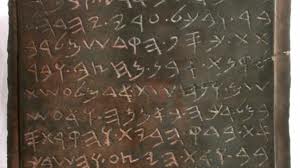It only took ten years and a zillion shekels, but finally the IAA has been told to take their marbles and go home, and oh yes, and to give back Oded Golan’s marble as well. It remains to be seen what will happen to Golan’s claim to the James ossuary, but this is a partial victory for his claims. Here is a portion of the article by Matthew Kalman about the surprising outcome. See what you think BW3.
By Matthew Kalman
Foreign Correspondent In Jerusalem
BIBLE & INTERPRETATION
October 2013
The Israel Antiquities Authority has failed in its last-gasp attempt to confiscate the controversial Jehoash Tablet from Israeli collector Oded Golan. In a verdict handed down on Wednesday, the three-judge appeal panel of Supreme Court justices decided by 2-1 that the inscribed tablet must be returned to Golan, who was acquitted last year of forging after a ten-year prosecution and trial.
The Supreme Court ruling caps a crushing defeat for the Israel Antiquities Authority following the sweeping 2012 acquittal of Israeli Golan and dealer Robert Deutsch on multiple charges of archaeological forgery. Israeli prosecutors advised by the Israel Antiquities Authority had argued that even though they continue to believe the inscription is a modern forgery, the reverse of the stone had been “dressed” in ancient times and was therefore classified as an antiquity that should belong to the state. But those arguments were rejected by the majority decision of the court. Oded Golan is now poised to reclaim both the tablet and the more famous item, the James ossuary, along with dozens of pieces confiscated by the Israel Antiquities Authority and the Israeli police at the time of his arrest in 2003. Golan greeted the decision as “good news.” He says he plans to put both the ossuary and the tablet on public display.
The latest about-turn could be the final twist in a nail-biting finale to the decade-long pursuit of Golan. However, a sternly-worded ruling by the same court in September suggests that the battle over the future of the antiquities trade is just beginning.
In an 8,000-word ruling handed down on September 29, a panel of three Supreme Court Justices rejected Golan’s appeal against his conviction and sentence on three minor charges and used the opportunity to declare war on the antiquities market. Branding the trade in antiquities “damaging” and motivated by “avarice,” the ruling authored by Supreme Court Justice Daphne Barak-Erez depicts “a world of collectors exchanging treasures teeming with trembling hands and heart – often within the law, and sometimes without,” and notes with approval that “in most countries of the world there is a general ban on the trade in antiquities, because of their recognition as a national resource.” She further observed, that this “conception also serves as the basis for the antiquities law” in Israel.














